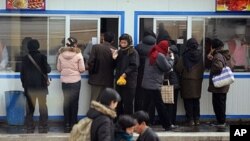Economists say new sanctions imposed by South Korea against North Korea are likely to worsen the country's fragile economy. The United States has also announced a new round of financial sanctions, in part to attempt to further restrict funding and proliferation of North Korea's weapons programs.
A North Korean newscaster reports on the country's economic achievements, announcing that cement production is at a record level. Next there is a story about innovations in transporting construction materials to the site of a 100,000-unit housing complex in Pyongyang. And a report about success with raising goats whose milk is being sent to day care centers and kindergartens.
It is a robust portrayal of one of the world's few remaining centrally planned economies. But the reality is far different in a place where the gross domestic product is comparable to that of Bangladesh and Zimbabwe, among the poorest countries.
|
After the sinking of the Cheonan, a South Korean warship, in the Yellow Sea in late March, the South cut off most trade with the North. Seoul, Washington and others blame North Korea for attacking the coastal naval vessel.
The Korea Development Institute, a South Korean state-run institution, says, as a result, the North's economy is likely to further shrink this year, and the sanctions imposed by the South could cost the already impoverished North hundreds of millions of dollars.
South Korea's central bank says the communist state's economy contracted nearly one percent last year and has seen no growth in recent years except for a three percent jump in 2008. It blames poor harvests, a manufacturing slump, a reduction of aid and restricted private market activities all amid the strengthened international sanctions.
By contrast, the Bank of Korea forecasts growth this year of nearly six percent for the South Korean economy.
Seoul-based research fellow Cho Boo Hyung of the IBK Economic Research Institute agrees with the negative forecast for North Korea. He says the sanctions and restrictions imposed on North Korea's trade are causing a shortage of raw materials. That has reduced output. Consequently, he says, decreased food production will certainly lead to negative economic growth in the North.
Cho is among those warning this could cause famine similar to the 1990's when hundreds of thousands of North Koreans apparently succumbed to starvation or disease.
Intense famine, he warns, will cause people to fend for themselves and the North Korean government to respond with harsher restrictions. That, he says, could lead to open conflict between the people and the authorities.
Cho also predicts the tightened restrictions imposed by the international community will result in more illicit trade with China, Mongolia and Russia.
North Korea appears to be receiving little legitimate additional assistance from China, its traditional ally.
Park In Ho is the manager of the Daily NK, a Seoul-based website which sources its reports from informants in North Korea. He contends Beijing offers the only hope for Pyongyang to avoid a catastrophe in the months ahead.
He says the North Korean government has again approved private trade with China and given guidelines to foreign-currency earning institutions to acquire food and fuel by any means possible.
Park says he expects that, at the same time, the government will try to take the country back to the era of the late 1980's when the central authorities held a much tighter grip on production, distribution, markets and consumption.
In announcing new financial sanctions on North Korea, U.S. Secretary of State Hillary Clinton emphasized the measures target Pyongyang's elite, not the already destitute masses in one of the world's most isolated nations.




